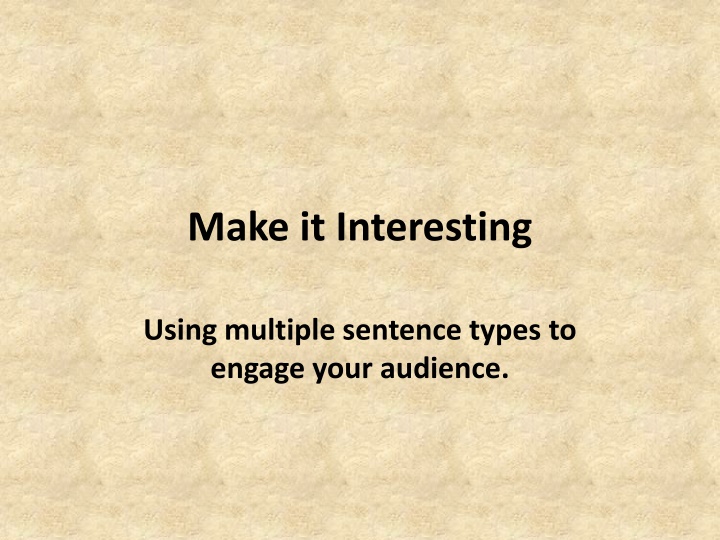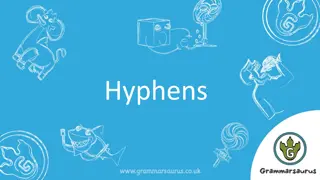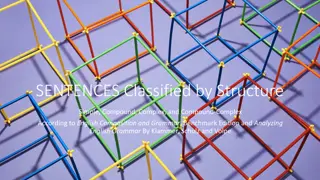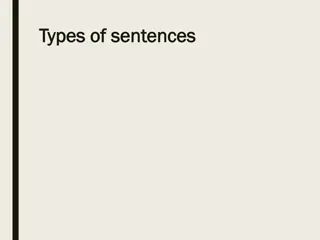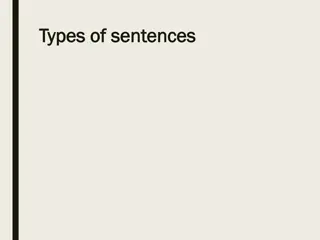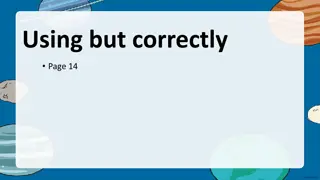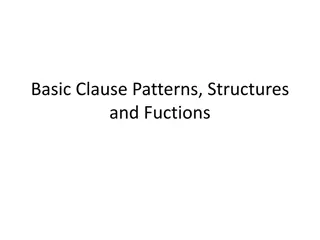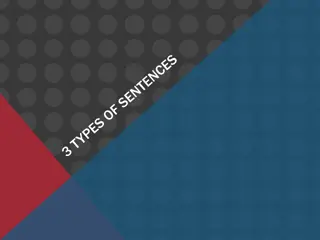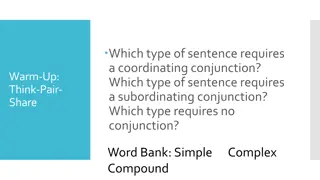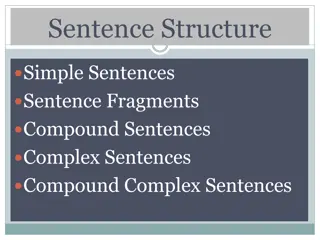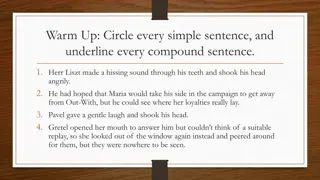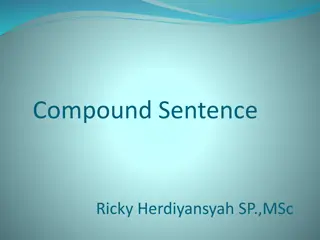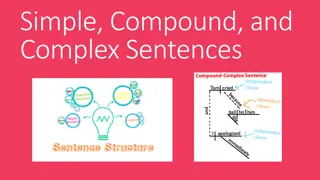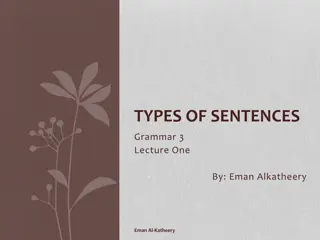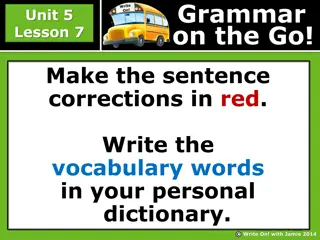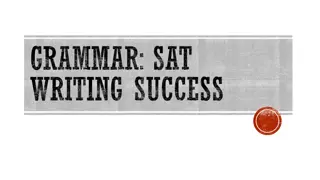Mastering Sentence Types: Simple, Compound, and Complex Structures
Diving into the world of sentence construction, we explore the beauty of Simple, Compound, and Complex sentences. Learn how to differentiate between Clauses and Phrases, craft Independent and Subordinate Clauses, and understand why these elements are crucial for engaging writing. Discover the art of blending sentence types to captivate your audience and elevate your writing skills to new heights.
Download Presentation

Please find below an Image/Link to download the presentation.
The content on the website is provided AS IS for your information and personal use only. It may not be sold, licensed, or shared on other websites without obtaining consent from the author.If you encounter any issues during the download, it is possible that the publisher has removed the file from their server.
You are allowed to download the files provided on this website for personal or commercial use, subject to the condition that they are used lawfully. All files are the property of their respective owners.
The content on the website is provided AS IS for your information and personal use only. It may not be sold, licensed, or shared on other websites without obtaining consent from the author.
E N D
Presentation Transcript
Make it Interesting Using multiple sentence types to engage your audience.
What are we learning? How to write Simple, Compound, and Complex sentences
Why are we learning these? Reading our essays is more interesting when we use different types of sentences. We want our readers to pay attention!
Whats the difference between a Clause and a Phrase? Clause- A group of words with its own subject and verb. Ex.: The girl skipped. Phrase- A group of words that does not contain a subject and a verb. Ex.: Looking at Matthew.
Independent Clause An Independent Clause, also known as a main clause, has a subject and a verb and can stand by itself as a complete sentence. Ex.: 1. He began reading his book. 2. Brett went to the lake.
Can you make an Independent Clause? 1. 2. 3.
Subordinate Clause A Subordinate Clause, also known as a dependent clause, has a subject and a verb but cannot stand by itself as a complete sentence. (It s only part of a sentence). Ex.: 1. After she presented her paper 2. While the group studied
Can you make a Subordinate Clause? 1. 2. 3.
Why do we need to know clauses?
Simple, Compound, and Complex Sentences Simple Sentence- consists of a single INDEPENDENT CLAUSE. Compound Sentence- Consist of two or more INDEPENDENT CLAUSES. Complex Sentence- Consists of one INDEPENDENT CLAUSE and one or more SUBORDINATE CLAUSES.
Simple Sentence A Simple Sentence consists of a single INDEPENDENT CLAUSE. Length is not an indicator! Must contain a subject and a verb May contain more than one subject and more than one verb. No extra punctuation!
Simple Sentence Examples With One Subject and One Verb: The snow fell. With a Compound Subject: Snow and ice are common With a Compound Verb: The window squeaked and shook.
Simple Sentence Examples Cont. With a Compound Subject and a Compound Verb: My brother and sister brought bagels and made coffee for brunch.
Can You Write a Simple Sentence? 1. With one subject and one verb. 2. With a compound subject. 3. With a compound verb. 4. With a compound subject and compound verb.
Compound Sentence A Compound Sentence consist of two or more INDEPENDENT CLAUSES. May be joined by a comma and a coordinating conjunction. Remember F.A.N.B.O.Y.S. May be joined by a semicolon or a colon
F.A.N.B.O.Y.S. For And Nor But Or Yet So
Fill It In! F A N B O Y S
Compound Sentence Examples With a comma and a coordinating conjunction: Jamie ran a two-day athletic clinic, and four professional athletes donated their time. With a semi-colon or a colon: All of the athletes spoke on the first day; one was missing the second day.
Can you write a Compound Sentence? 1. 2. 3.
Complex Sentences A Complex Sentence consists of one INDEPENDENT CLAUSE and one or more SUBORDINATE CLAUSES. -Remember, an independent clause can stand alone, a subordinate clause can not!
Complex Sentence Examples Because this day is so important, celebrations of all kinds take place. Citizens, who have the day off, participate in exciting activities.
Can you write a Complex Sentence? 1. 2. 3.
